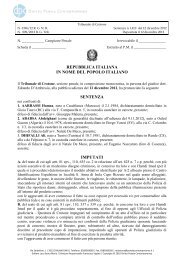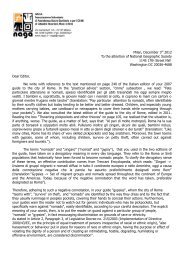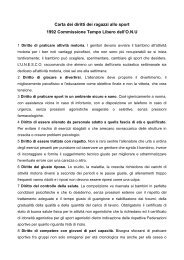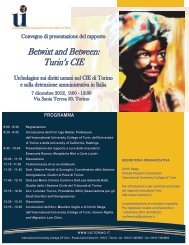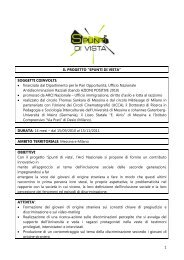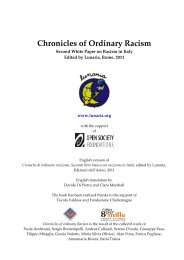Chronicles of ordinary racism 2011 - Cronache di ordinario razzismo
Chronicles of ordinary racism 2011 - Cronache di ordinario razzismo
Chronicles of ordinary racism 2011 - Cronache di ordinario razzismo
- No tags were found...
Create successful ePaper yourself
Turn your PDF publications into a flip-book with our unique Google optimized e-Paper software.
nationality still prevail over others, such as mutual assistance within a group <strong>of</strong> people<br />
from the same country.<br />
In the past, particularly during the ‘90s, this manner <strong>of</strong> communal living seemed like it<br />
might evolve into more mature and <strong>di</strong>versified types <strong>of</strong> association (cultural, political,<br />
athletic, based on voluntary work and so forth). The rapid transformations that have<br />
characterised the world <strong>of</strong> immigration in recent years, together with the dowturn<br />
which has affected immigrants’ living con<strong>di</strong>tions and the failure <strong>of</strong> many projects that<br />
marked the first phase, between the end <strong>of</strong> the ‘80s and the beginning <strong>of</strong> the ‘90s,<br />
ensured that the spread <strong>of</strong> opportunities remained contained within certain limits.<br />
However, several meaningful initiatives arose in newly devised areas <strong>of</strong> intervention.<br />
Readers may recall, for example, the foreign youth who, referring both to their<br />
countries <strong>of</strong> origin and, more frequently, to their status <strong>of</strong> Italians in every way except<br />
by law, initiated various communal experiences, albeit fragile, as is the case with most<br />
associations built up around young people. It is necessary to pay close attention to this<br />
ever‐changing world, promoting its growth and development by means <strong>of</strong> specific<br />
projects and resources. We need only think, for example, <strong>of</strong> the initiative carried out by<br />
the Emilia Romagna region to allow young people <strong>of</strong> foreign origin to participate in the<br />
regional civil service scheme.<br />
Strong commitment is also essential in the field <strong>of</strong> women’s associations, wich already<br />
operate today but have not so far proved hugely successful, to prevent female<br />
emancipation and the con<strong>di</strong>tion <strong>of</strong> foreign women, young or otherwise, from remaining<br />
trapped between a public portrayal linked to cultural anti‐immigrant and anti‐Islamic<br />
stereotypes and a forced isolation, fuelled by the social and institutional <strong>di</strong>scrimination<br />
that impacts foreign families.<br />
The projects undertaken recently or in the past, as well as the various forms <strong>of</strong> assembly<br />
that can be encountered within the social environments already frequented by<br />
immigrants (places <strong>of</strong> gathering, either formal or informal, with all their possible<br />
ramifications), must be encouraged with targeted policies and the use <strong>of</strong> public<br />
resources, in such a way as to invest in the future <strong>of</strong> our democracy.<br />
Social organizations, at least in part, are also trying to assist the process <strong>of</strong> participation<br />
and association undertaken by immigrants, admittedly with many limitations and<br />
contra<strong>di</strong>ctions. We are dealing with a complex task that requires a structural change in<br />
the manner in which in<strong>di</strong>vidual initiative is promoted and community leaders are<br />
selected. In this like in other areas, immigration gives rise to questions that concern all<br />
<strong>of</strong> us, because the space for participation, in<strong>di</strong>pendence and personal achievement<br />
within social organizations is <strong>of</strong>ten limited and regimented.<br />
It is necessary to promote initiatives aimed at revitalizing the area by creating dynamic<br />
and pluralist relationships and, in this way, inventing new outlets for the personal<br />
development <strong>of</strong> foreigners, within collective projects aimed solely at achieving these<br />
goals.<br />
In order to reach such important targets, it is may also prove necessary for the<br />
organizations to shed some <strong>of</strong> their old habits and, above all, to revise procedures,<br />
timing and mechanisms that help to create the spaces which can be filled by new<br />
community leaders.<br />
64




